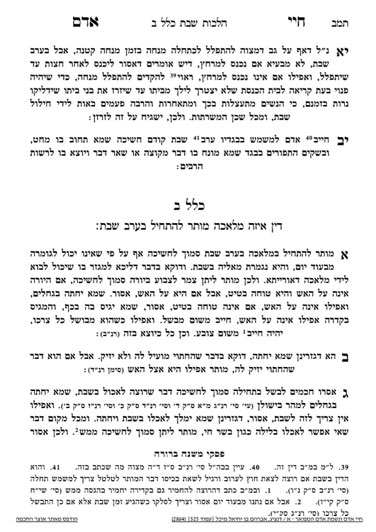We are beginning siman 3, where the Chayei Adam is discussing performing an action on erev Shabbos which will cause melacha to be performed on Shabbos itself. We will begin with an introduction.
When it comes to food, meaning, a person setting up their food in a way that it will continue to cook into Shabbos, Chazal discuss three concerns:
- Shehiya, leaving something on the fire from before Shabbos going into Shabbos.
- Chazara, taking food off of the fire after Shabbos has started, and returning it to the fire later on Shabbos.
This concern is generally not applicable when going from erev Shabbos into Shabbos itself, except for one case in which one took food off right before Shabbos, and wishes to return it once Shabbos has already begun. However, the vast majority of cases of chazara involve actions performed completely on Shabbos. - Hatmana, taking something off the fire and insulating it in a way that it will keep its warmth over Shabbos. As opposed to shehiya and chazara which deal with a fire source, hatmana regards insulating the food item, and there is a concern that a person will forget themselves and perform prohibited melachos.
We will begin with shehiya. Shehiya involves cooking before Shabbos and leaving a fire running into Shabbos with food on it. Chazal had two potential concerns. The first is that the person may perform an action to enhance the cooking process, such as stirring the pot or turning over the meat. Anything which causes the cooking process to speed up is considered cooking. The second concern is the concern of stirring the coals, which applies even if the food is fully cooked. This is known as ma’avir, causing a fire.
The Chayei Adam writes that it is assur to put something to cook on erev Shabbos in order to eat it on Shabbos, out of concern that one will stir the coals to speed up the cooking process. Furthermore, even if one does not plan to eat that item on Shabbos, it is still assur, out of concern that one may change their mind and decide that they want to eat it on Shabbos. Once they decide that they wish to eat it on Shabbos, we are concerned that they may stir the coals in order to ensure the food is ready to be eaten.
It is notable that the Chayei Adam is more concerned about ma’avir and seems less concerned about the bishul. We will discuss why this is so in upcoming shiurim. We will also discuss how our modern stoves, whether of gas or electricity, fit into these concerns.
Summary
Chazal have three concerns regarding food on Shabbos:
- Shehiya, leaving something on the fire from before Shabbos;
- Chazara, taking something off and putting it back on a heat source on Shabbos itself;
- Hatmana, insulating something after it is off of the fire.
Regarding shehiya, Chazal were concerned that a person may either stir the coals (ma’avir) or the food (bishul). However, the Chayei Adam appears less concerned about bishul and more about ma’avir.
Pesach 5783
Click here to watch Rabbi Reingold performing a Model Seder.



